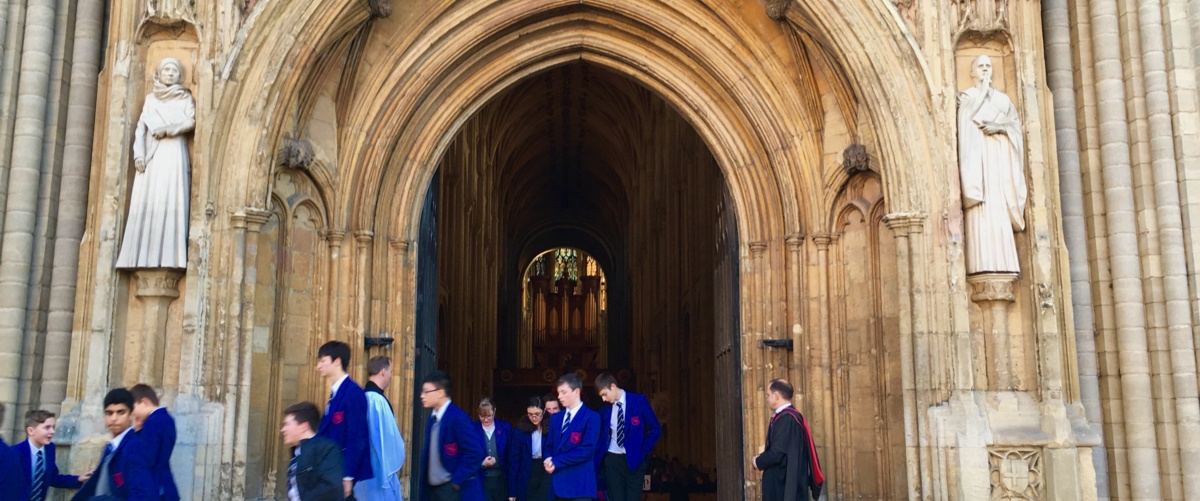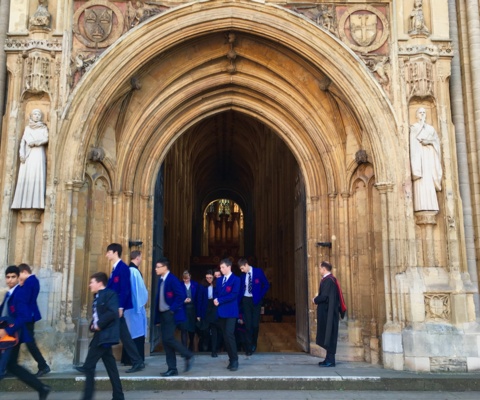Head Master's Start of Lent Term Address; the power of language
Tuesday 8th January 2019
Welcome back to the Cathedral and good wishes for 2019; I hope it brings you what you hope for. I am sure that many of you will already have been swapping stories of what you did over the holiday: favoured presents at Christmas and particularly enjoyable experiences. One of my favourite presents was a book of poems from a collection by Brian Bilston, called You took the last bus home. The title poem goes as follows:
You took
The last bus home
Don’t know how
You got it through the door
You’re always doing amazing stuff
Like the time
You caught the train
Bilston has lots of fun with bending the meaning of common words and phrases. Other poems include The Ballad of the Ballot Paper:
I spoilt
My ballot paper
Gave it treats,
Bought it sweets,
Mooned around,
Doted
And, in the process,
Became hopelessly de-voted
He also likes to explore verbal oddities, such as in Divided by a Common Language
Americans,
I have news to report.
I have done the ‘math’,
You are one letter short.
You could borrow one
From the end of ‘sports’.
These examples are light-hearted and remind us of the playfulness and curiosity possible with a love of language. Yet it is more than that: we are in large part defined by the way we understand each other and express ourselves, whether in conversation, on paper or online, whether in formal situations with teachers, parents and colleagues or socially with friends.
It is felt by some that our national education system puts too much weight on STEM (science, technology, engineering and maths). At Norwich School, I think it is right that these key 21st century skills are given appropriate weight in our compulsory curriculum and interest large numbers of our pupils in the 6th Form. I am also very proud that creativity is a key part of our provision for all age-groups, both in lessons and the co-curriculum. However, I do detect that subjects which foreground literacy and language need care and nurturing in our context.
A love of language can be at several levels:
- It can be an interest in individual words, where they come from, what they sound like and what they mean;
- It could be the way that a language is constructed and the expressive possibilities conjured by this structure;
- Or it could be the way that different languages inform and relate to each other, both in similarities and differences.
All three levels aid our interpretation of the world around us and our interactions with others. And, of course, there is no real distinction between other disciplines such as STEM and creativity; what are Brian Bilston’s poems if not creative wordplay? Professor Winston (one of the country’s leading voices for the wider understanding of science) advocates strongly for the development of literacy alongside STEM, while the science-leaning Wolfson Foundation recently created a £10 million fund to support research in humanities. There is another school which has just appointed an orator-in-residence to assist pupils with their communication skills. For our part, we have created the important role of Literacy Co-ordinator, who is Ms Roper.
I encourage you to read books: I am not fussy about whether they are fiction or non-fiction, whether they are hard-copy or on something like a kindle. Pick stories or subjects which interest you, but do have something on the go. I also encourage you to reflect on your own use of words and to be sensitive to how others communicate with you. I do not know what the New Year will bring, but I am sure that being a confident and proficient communicator via different media will shape your way through life, both in 2019 and beyond.
To illustrate the power of language in different contexts, I return to Brian Bilston and a poem of a different tone. This is called Refugees:
They have no need of our help
So do not tell me
These haggard faces could belong to you or me
Should life have dealt a different hand
We need to see them for who they really are
Chancers and scroungers
Layabouts and loungers
With bombs up their sleeves
Cut-throats and thieves
They are not
Welcome here
We should make them
Go back to where they came from
They cannot
Share our food
Share our homes
Share our countries
Instead let us
Build a wall to keep them out
It is not okay to say
These people are just like us
A place should only belong to those who are born there
Do not be so stupid to think that
The world can be looked at another way
(Now read from bottom to top)
For the avoidance of doubt, my heart lies much more with the tolerance of the second version than the intolerance of the first, but my main point is that the same words in this poem can create such contradictory viewpoints, depending on the order of their use. I will put a transcript on the website’s school blog so that, if you are interested, you can look at the layout on the page which makes the poem work.
Today’s bible reading asserts the wisdom which comes from listening and understanding. All this comes from a recognition in the power of language. I encourage you to harness it as you enjoy this new term.


